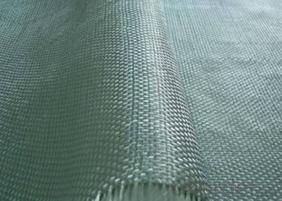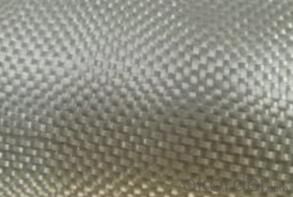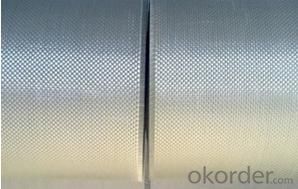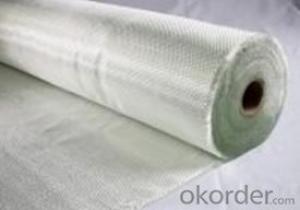E-glass Fiberglass Woven Roving,300g,1200mm
- Loading Port:
- Shanghai
- Payment Terms:
- TT or LC
- Min Order Qty:
- 5000 m²
- Supply Capability:
- 50000 m²/month
OKorder Service Pledge
OKorder Financial Service
You Might Also Like
Structure of woven roving Description
Woven roving is made of direct rovings in Plain,Twill weave pattern.The input rovings are designed to give controlled wet-out and excellent laminate properties. It is compatible with Polyester,Vinyl ester and Epoxy resin and widely used in hand machine production, such as boats,vessels,plane and automotive parts,furniture,sports and other areas.
Application of Fiberglass Woven Roving:
a) boats ,vessels ,plane
b) automotive parts ,furniture and sports facilities
c) resins system,such as polyeser,vinylester and epoxy resins
Woven roving Images



Woven roving Specification:
Normal type | EWR800 | EWR400 | EWR300 | EWR500 | EWR600 |
Thickness (mm) | 0.8 | 0.4 | 0.3 | 0.5 | 0.6 |
Density(warpxweft) (end/cm) | 1.8x1.5+/-10% | 3.6x3.2+/-10% | 4.6x4.1+/-10% | 2.2X2.0+/-10% | 2.6X2.4+/-10% |
Tex (warpxweft) | 2400x2400 | 600X600 | 300x400 | 1200x1200 | 1200X1200 |
Moisture content(%) | <0.2% | <0.2% | <0.2% | <0.2% | <0.2% |
Loss on ignition(%) | 0.4 – 0.8 | 0.4-0.8 | 0.4-0.8 | 0.4-08 | 0.4-0.8 |
Width(cm) | 125+/-1 | 125+/-1 | 125+/-1 | 125+/-1 | 125+/-1 |
Weight (g/m2) | 816+/-41 | 408+/-32 | 300+/-15 | 500+/-25 | 600+/-30 |
Weight per roll(kg) | 45 | 46 | 50 | 45 | 45 |
Glass | E-glass | E-glass | E-glass | E-glass | E-glass |
FAQ of woven roving:
1.Q: What specification do you have for e-glass woven roving ?
A: Now our normal specification have 400/450/500/600/800g/m2, But 200 - 1600g/m2 are available.
2.Q:How about the width?
A:The normal width is 1040mm and 1270mm, can be from 50mm to 3000mm.
3.Q:How about the sample delivery?
A.Small sample is free of charge, sample ready time 3-5days.
4.Q:How about the delivery time?
A:It is depend on the order quantity, three 20'ft container around 20days.
- Q:What is the weathering resistance of fiberglass mat tissue?
- The weathering resistance of fiberglass mat tissue is generally considered to be high. Fiberglass mat tissue is made from a combination of fiberglass strands and a binder material, such as polyester or acrylic. This combination creates a strong and durable material that is resistant to various weathering factors, including exposure to sunlight, moisture, and temperature fluctuations. The fiberglass strands in the mat tissue provide excellent mechanical strength, preventing the material from breaking down under external stress or pressure. This strength helps the mat tissue withstand the impact of wind, rain, and other weather elements without significant damage. Additionally, the binder material used in the manufacturing process of fiberglass mat tissue is often formulated to be resistant to UV radiation. This UV resistance helps to protect the material from degradation and color fading caused by prolonged exposure to sunlight. It also helps to maintain the structural integrity and strength of the mat tissue over time. Furthermore, fiberglass mat tissue is also resistant to moisture and water absorption. This resistance prevents the material from becoming weakened or deteriorated when exposed to rain, humidity, or other moisture sources. As a result, the mat tissue remains intact and retains its performance properties even in wet or humid conditions. Overall, the weathering resistance of fiberglass mat tissue is considered to be excellent, making it a popular choice for various applications where durability and longevity in outdoor environments are required.
- Q:Can fiberglass mat tissue be used for making surfboards?
- Yes, fiberglass mat tissue can be used for making surfboards. It is a common material used in the construction of surfboards due to its strength, durability, and ability to provide the necessary stiffness and flexibility required for optimal performance in the water.
- Q:Is fiberglass mat tissue suitable for chemical storage tanks?
- Chemical storage tanks often find fiberglass mat tissue to be a suitable choice. The chemical resistance properties of fiberglass itself are well-known, which is why it is commonly used for storing a wide variety of chemicals. Moreover, fiberglass mat tissue is typically employed as a reinforcement layer during the construction of fiberglass tanks, providing them with added strength and durability. Nevertheless, it is important to consider the specific chemical being stored. Certain highly corrosive or reactive chemicals may necessitate the use of more specialized materials or additional protective coatings to ensure the tank's integrity. Therefore, it is always advisable to seek guidance from a professional engineer or manufacturer in order to identify the most appropriate materials for a given chemical storage application.
- Q:What is the chemical resistance of fiberglass mat tissue?
- Fiberglass mat tissue has excellent chemical resistance due to its composition, which includes a high percentage of glass fibers. These fibers provide a barrier against various chemicals, making the fiberglass mat tissue highly resistant to corrosion and degradation when exposed to acids, alkalis, solvents, and other harsh chemicals.
- Q:How thick is fiberglass mat tissue typically?
- Fiberglass mat tissue, which is sometimes referred to as fiberglass mat or simply mat, is available in different thicknesses depending on its intended purpose. It can be as thin as 0.5 millimeters (mm) or as thick as 3 mm. However, the thicknesses most commonly used for fiberglass mat tissue are 1.5 mm and 2 mm. These thicknesses are well-suited for reinforcing laminates, composite materials, and creating surface finishes. It should be noted that the actual thickness of fiberglass mat tissue may vary depending on the manufacturer and the specific project requirements.
- Q:Can fiberglass mat tissue be used for making lightweight automotive parts?
- Yes, fiberglass mat tissue can be used for making lightweight automotive parts. Fiberglass mat tissue is a lightweight, versatile material that is commonly used in the manufacturing of automotive parts. It offers excellent strength-to-weight ratio, making it ideal for producing lightweight components without compromising on durability and performance. Additionally, fiberglass mat tissue can be easily molded into various shapes, allowing for complex designs and customization in automotive parts. Moreover, it provides good resistance to corrosion, chemicals, and temperature fluctuations, further enhancing its suitability for automotive applications. Overall, fiberglass mat tissue is a reliable and cost-effective choice for creating lightweight automotive parts.
- Q:What is the typical thickness range of fiberglass mat tissue?
- The typical thickness range of fiberglass mat tissue is between 0.3 to 1.5 millimeters.
- Q:Can fiberglass mat tissue be used for electrical insulation?
- Yes, fiberglass mat tissue can be used for electrical insulation. Fiberglass mat tissue is a non-woven fabric made from fine glass fibers, and it has excellent electrical insulation properties. It is capable of withstanding high temperatures and has a high dielectric strength, making it suitable for various electrical applications. It is commonly used as an insulation material in electrical transformers, motors, generators, and other electrical equipment. The fiberglass mat tissue provides a barrier that prevents the flow of electrical current and protects the components from electrical shocks or short circuits. Additionally, it is also resistant to moisture, chemicals, and UV radiation, further enhancing its suitability for electrical insulation.
- Q:Is fiberglass mat tissue suitable for aerospace repairs?
- Yes, fiberglass mat tissue is suitable for aerospace repairs. It is a lightweight and strong material that can be used to reinforce and repair aerospace structures. It provides excellent strength-to-weight ratio and has good resistance to corrosion and heat. Additionally, it is easy to work with and can be molded into various shapes to fit the specific repair requirements.
- Q:What is the delamination strength of fiberglass mat tissue?
- The delamination strength of fiberglass mat tissue refers to its ability to resist separation or peeling of layers within the material. It is a measure of the adhesive strength between the fibers and the binder in the mat. The specific delamination strength of fiberglass mat tissue can vary depending on factors such as the manufacturing process, binder type, and overall composition of the material.
1. Manufacturer Overview |
|
|---|---|
| Location | |
| Year Established | |
| Annual Output Value | |
| Main Markets | |
| Company Certifications | |
2. Manufacturer Certificates |
|
|---|---|
| a) Certification Name | |
| Range | |
| Reference | |
| Validity Period | |
3. Manufacturer Capability |
|
|---|---|
| a)Trade Capacity | |
| Nearest Port | |
| Export Percentage | |
| No.of Employees in Trade Department | |
| Language Spoken: | |
| b)Factory Information | |
| Factory Size: | |
| No. of Production Lines | |
| Contract Manufacturing | |
| Product Price Range | |
Send your message to us
E-glass Fiberglass Woven Roving,300g,1200mm
- Loading Port:
- Shanghai
- Payment Terms:
- TT or LC
- Min Order Qty:
- 5000 m²
- Supply Capability:
- 50000 m²/month
OKorder Service Pledge
OKorder Financial Service
Similar products
New products
Hot products
Related keywords



























